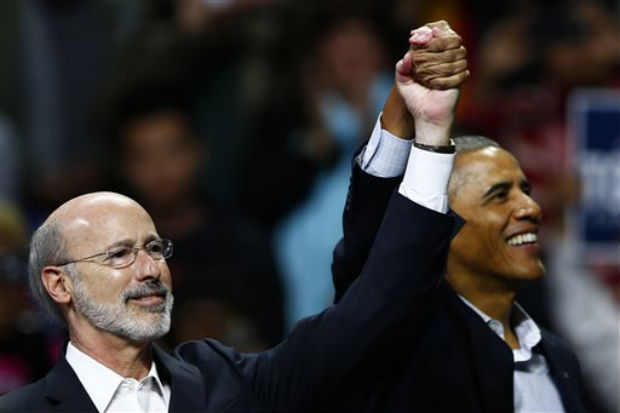Costly, competitive US Senate campaign nears end

President Barack Obama, right, campaigns for Pennsylvania Democratic gubernatorial candidate Tom Wolf Sunday at Temple University in Philadelphia. AP
WASHINGTON—Republicans strained to capture control of the Senate while Democrats struggled to limit their congressional losses on a final day of campaigning for elections that could change the balance of power midway through an unpopular President Barack Obama’s second term.
Democrats weighed down by Obama’s low approval ratings kept their distance from him and looked to a costly turn-out-the-vote operation in the most competitive Senate races to save their seats and their majority in Tuesday’s election.
The Democrats have worked furiously to reach out to minority and poor voters who tend to sit out elections when the presidency is not at stake.
“Despite all the cynicism America is making progress,” Obama said as he implored Democrats in Connecticut to vote. “Don’t stay home. Don’t let somebody else choose your future for you.”
Unlike the Democrats, Republicans working to fire up their own core voters had a unified message, casting the election as a referendum on Obama.
Article continues after this advertisementRepublicans need six seats to win control of the Senate, the biggest prize in the election. There was little suspense in the House races, with not even Democrats predicting they would be able to take control away from the Republicans. Instead, the Democrats concentrated on protecting their incumbents and keeping the Republicans from padding their majority too much.
Article continues after this advertisementWith a handful of close races expected to decide control of the Senate, astronomical spending and cease-less attack ads have dominated campaigning — with a few ideas offered on how best to govern the nation. Serious discussions about deficit spending, climate change, immigration, and other knotty issues rarely emerged.
Partisan fighting and legislative inaction have already characterized Washington in recent years, peaking in 2013 with budget fights that shut down the government and raised the specter of a default on the federal debt.
With a Democrat in the White House and Republicans in control of Congress, a big question is whether the legislative paralysis would deepen or whether political reality will push both sides to compromise at least on modest goals.
Republicans may be emboldened to intensify conflicts with an unpopular president in the last years of his term, but they risk Obama’s veto if they push too hard for lower taxes, fewer regulations and other conservative priorities. Trade agreements that Obama supports, and changes to the immigration system that many Republicans favor, could offer chances for agreements.
Uncertainties in several tight races meant there was a strong possibility that neither party would be able to claim a Senate majority by the morning after Election Day.
Republicans were all but assured of winning Democratic-held seats in West Virginia, Montana and South Dakota, and Democrats held out little hope of a victory in Arkansas.
Polls suggested that races for Democratic-held seats in Iowa, Colorado and Alaska have tilted the Republicans’ way, too — although Democrats said their get-out-the-vote operation made any predictions unreliable.
Democratic incumbents faced competitive races in New Hampshire and in North Carolina where Democrats said they had an edge — and Republicans disagreed.
Strategists in both parties said Louisiana and Georgia were both likely headed for runoffs . The wildest wild card of all was in Kansas, where polls said 78-year-old Republican Sen. Pat Roberts was in a close race with independent Greg Orman.
Obama was back at the White House after making his final campaign appearances over the weekend. He raised tens of millions of dollars over two years for Democratic candidates, but in the races’ final days most members of his party opted not to appear in public with him because of his poor approval ratings.
“There are two people on the ballot tomorrow: me and Scott Brown,” said Sen. Jeanne Shaheen of New Hampshire as she made the rounds of six campaign stops on the race’s final full day.
North Carolina Sen. Kay Hagan was one Democrat in a marquee race quietly accepting a bit of last-minute help from the president. She has spent much of the year distancing herself from Obama, but her campaign sponsored a radio ad featuring Obama calling her a tireless leader “who shares our priorities.” It was unclear where Hagan’s campaign was airing the ads, but other candidates have used similar ads to boost turnout among African-American voters still loyal to the president.
Also on the ballot were gubernatorial elections in 36 states.
Among the most closely watched is Wisconsin, where Republican Gov. Scott Walker is in neck-and-neck race with Democratic challenger Mary Burke. Walker, a favorite of conservative Republicans, is often mentioned as a potential candidate in 2016, but his White House chances would almost certainly evaporate if he lost Tuesday.
In another hard-fought race, Florida Republican Gov. Rick Scott is facing a tough challenge from Charlie Crist, a former Republican governor-turned-Democrat.